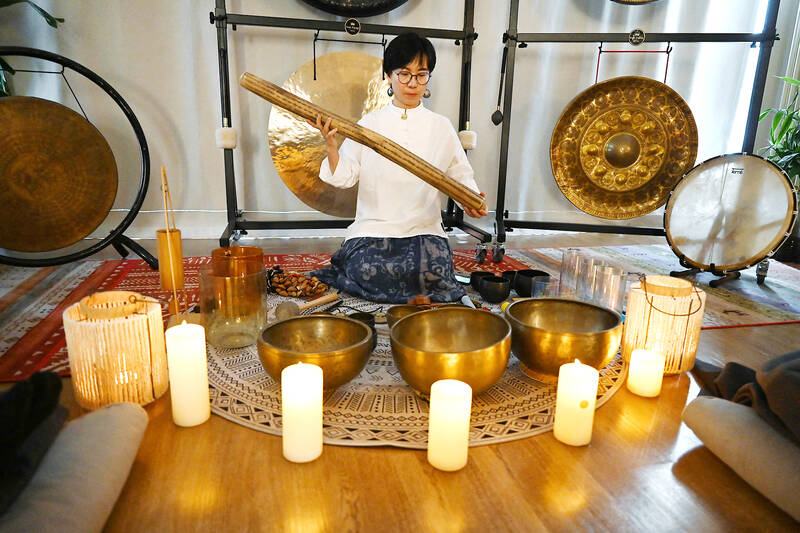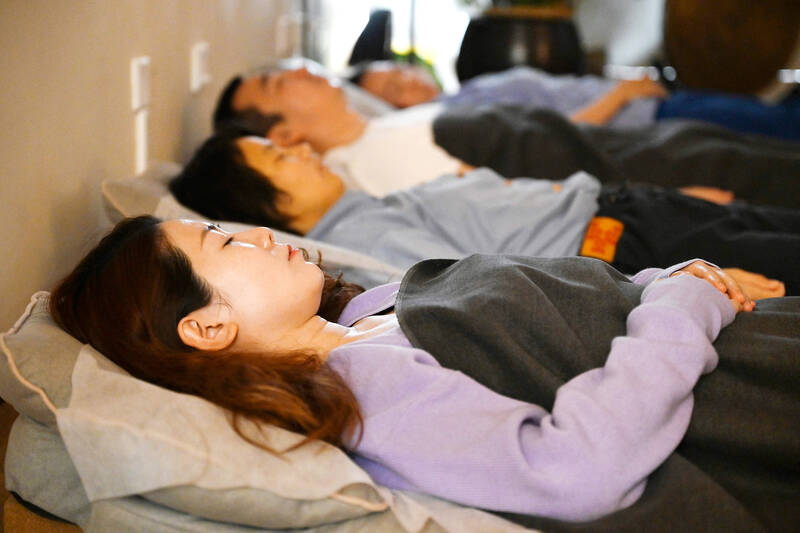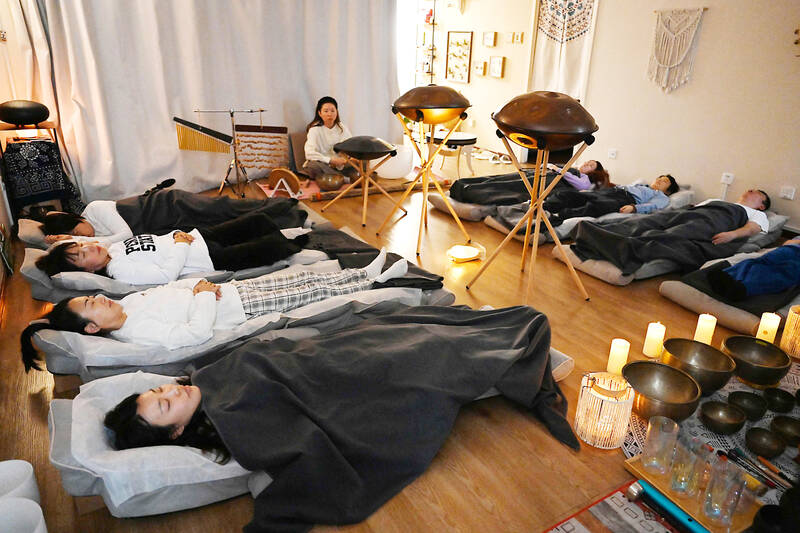It’s just after midday in a quiet studio in Beijing, and Xuan Yi is finally getting the deep sleep she’s craved for months.
Xuan is one of an estimated 300 million Chinese people suffering from insomnia, the product of a high-stress, high-pressure culture that has left many young people choosing to “lie flat” instead.
She tried everything, she says — from psychological counselling to essential oils.

Photo: AFP
“I had a lot of work pressure. I could not go to bed before 2 or 3am and had to get up at 7am to start work,” she says. “I also worked weekends, and my sleep was not very good for a long time.”
But when the curtains close and the singing bowls start humming at healer Li Yan’s studio, she can finally drift off.
To the sounds of a gong, Ukrainian water drum, rainstick and handpans, Xuan and her fellow millennials enter a gentle slumber.

Photo: AFP
Fifty minutes later, they awake after what they say is the best sleep they’ve had in years — at a cost of 180 yuan (US$25).
“Dozens of people with tense minds lay down together and want to give their brains a short break,” Li says.
“It’s like charging your cell phone battery from three percent to 100 percent.”

Photo: AFP
‘LIE FLAT CONCERTS’
“Pressure”, “anxiety” and “insomnia” are the words Li hears most often.
She says she often fields calls from clients desperate for a break.
“I need this therapy right away, in half an hour, I’m so tired,” Li says they tell her.
Many come from China’s competitive IT industry, which has some of the highest incidents of depression and anxiety in the country, according to a National White Paper on Health.
Giants like Alibaba — whose ex-CEO Jack Ma (馬雲) was notorious for demanding that his employees work long hours — have even used Li’s sessions as team-building exercises.
Li calls her work “lie flat concerts,” a reference to a popular meme extolling the virtues of trading the high-pressure life for something a little more easygoing.
But the singing bowls also tie into another growing trend: “short escapes,” in which young people snatch small, zen moments for themselves to escape the daily grind.
HAPPINESS A ‘LUXURY GOOD’
Surrounded by office buildings in the heart of Beijing, Li’s studio offers time slots tailored to the busy routines of young workers.
She says she has seen growing demand in the so-called sleep economy since the COVID-19 pandemic, which the WHO says sparked a 25 percent increase in incidents of depression and anxiety worldwide in its first year.
“Many emotions and problems have come to the surface and people need to deal with their inner selves,” Li says. “Many are actively seeking solutions since the pandemic.”
And in a country where many turn to video games or shopping to unwind, she says, “relaxation and happiness seem to be a luxury good.”
Xuan, for one, is happy to shell out for some decent sleep.
“If I don’t pay for these healing sessions, I might have to pay for the doctor.”

Behind a car repair business on a nondescript Thai street are the cherished pets of a rising TikTok animal influencer: two lions and a 200-kilogram lion-tiger hybrid called “Big George.” Lion ownership is legal in Thailand, and Tharnuwarht Plengkemratch is an enthusiastic advocate, posting updates on his feline companions to nearly three million followers. “They’re playful and affectionate, just like dogs or cats,” he said from inside their cage complex at his home in the northern city of Chiang Mai. Thailand’s captive lion population has exploded in recent years, with nearly 500 registered in zoos, breeding farms, petting cafes and homes. Experts warn the

No one saw it coming. Everyone — including the Chinese Nationalist Party (KMT) — expected at least some of the recall campaigns against 24 of its lawmakers and Hsinchu Mayor Ann Kao (高虹安) to succeed. Underground gamblers reportedly expected between five and eight lawmakers to lose their jobs. All of this analysis made sense, but contained a fatal flaw. The record of the recall campaigns, the collapse of the KMT-led recalls, and polling data all pointed to enthusiastic high turnout in support of the recall campaigns, and that those against the recalls were unenthusiastic and far less likely to vote. That

The unexpected collapse of the recall campaigns is being viewed through many lenses, most of them skewed and self-absorbed. The international media unsurprisingly focuses on what they perceive as the message that Taiwanese voters were sending in the failure of the mass recall, especially to China, the US and to friendly Western nations. This made some sense prior to early last month. One of the main arguments used by recall campaigners for recalling Chinese Nationalist Party (KMT) lawmakers was that they were too pro-China, and by extension not to be trusted with defending the nation. Also by extension, that argument could be

Aug. 4 to Aug. 10 When Coca-Cola finally pushed its way into Taiwan’s market in 1968, it allegedly vowed to wipe out its major domestic rival Hey Song within five years. But Hey Song, which began as a manual operation in a family cow shed in 1925, had proven its resilience, surviving numerous setbacks — including the loss of autonomy and nearly all its assets due to the Japanese colonial government’s wartime economic policy. By the 1960s, Hey Song had risen to the top of Taiwan’s beverage industry. This success was driven not only by president Chang Wen-chi’s